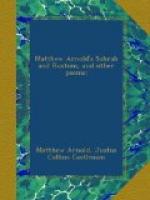=20. Arthur’s court.= Arthur, the half-mythical king of the Britons, set up his court at Camelot, which Caxton locates in Wales and Malory near Winchester. Here was gathered the famous company of champions known as the “Knights of the Round Table,” whose feats have been extensively celebrated in song and story. Among these knights Tristram held high rank, both as a warrior and a harpist. See ll. 17-19.
=23. Lyoness.= A mythical region near Cornwall, the home country of Arthur and Tristram.
=30-31.= Hence the name, Iseult of the White Hands.
=56-68.= See introductory note to poem for explanation. =Tyntagel.= A village in Cornwall near the sea. Near it is the ruined Tyntagel Castle, the reputed birthplace of Arthur. In the romance of Sir Tristram it is the castle of King Marc, the cowardly and treacherous king of Cornwall, the southwest county of England. =teen=. See note, l. 147, The Scholar-Gipsy. (Grief, sorrow; from the old English teona, meaning injury.)
=88. wanders=, in fancy. Note how the wounded knight’s mind flits from scene to scene, always centring around Iseult of Ireland.
=91. O’er ... sea.= The Irish Sea. He is dreaming of his return trip from Ireland with Iseult, “under the cloudless sky of May” (l. 96).
=129-132.= See introductory note to poem. The green isle, Ireland is noted for its green fields; hence the name, Emerald (green) Isle.
=134. on loud Tyntagel’s hill.= A high headland on the coast of Wales. Discuss the force of the adjective “loud” in this connection.
=137-160. And that ... more.= See introductory note to poem.
=161. pleasaunce-walks.= A pleasure garden, screened by trees, shrubs, and close hedges—here a trysting-place. After the marriage of Iseult to King Marc, she and Tristram contrived to continue their relationship in secret. [170]
=164. fay.= Faith. (Obsolete except in poetry.)
=180.= Tristram, having been discovered by King Marc in his intrigues with Iseult, was forced to leave Cornwall; hence his visit to Brittany and subsequent marriage to Iseult of the White Hands. See introductory note to poem.
=192. lovely orphan child.= Iseult of Brittany.
=194. chatelaine.= From the French, meaning the mistress of a chateau—a castle or fortress.
=200. stranger-knight, ill-starr’d.= That is, Tristram, whose many mishaps argued his being born under an unlucky star. See also the account of his birth, note, ll. 81-88, Part II.
=203. Launcelot’s guest at Joyous Gard.= Prior to his visit to Brittany, Tristram had imprisoned his uncle, King Marc, and eloped with Iseult to the domains of King Arthur. While there he resided at Joyous Gard, the favorite castle of Launcelot, which that knight assigned to the lovers as their abode.
=204. Welcomed here.= That is, in Brittany, where he was nursed back to health by Iseult of the White Hands. See introductory note to poem.




